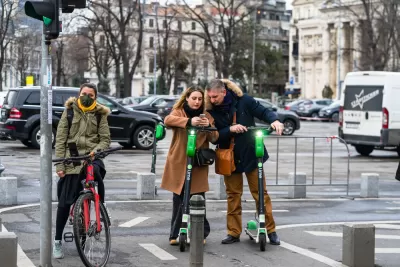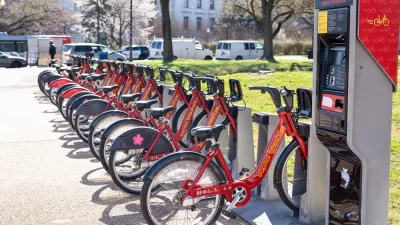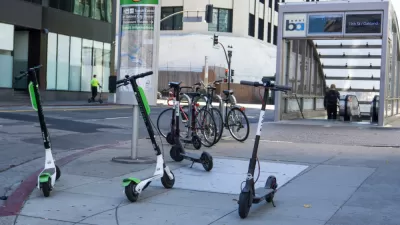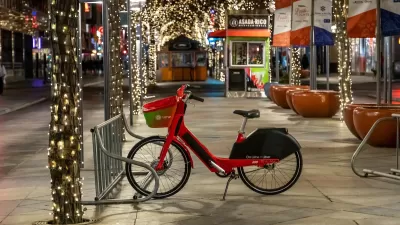Two new studies show that the adoption of shared micromobility can reduce transportation-related emissions and congestion by substantial margins.

New research shows that micromobility can reduce transportation emissions by wider margins than previously thought. Kea Wilson outlines the results of two new studies in an article for Streetsblog USA.
“The first study, conducted by academics at the Georgia Institute of Technology, found that travel times in Atlanta swelled an estimated 9 to 11 percent as a result of the city’s controversial 2019 decision to ban the modes after dark after drivers killed four riders.” During sporting events, that number shot up to 37 percent. A second report from Germany reveals that greenhouse gas emissions decreased as a result of shared micromobility adoption in six global cities. “That’s even accounting for the fact that some of those riders said they wouldn’t have made those trips at all if Lime wasn’t available — as well as the fact that others admitted to trading a comparatively greener walking, transit, or non-electric bike journey for a ride on an electric-assist mode.”
Taken together, Lime says the two studies are proof positive that cities are underestimating how critical micromobility is to their residents — and their collective climate future.
Wilson includes two caveats: the Atlanta study only had a few sporting events during the study period, and the German study was funded by Lime, a shared micromobility operator with an obvious stake in proving the benefits of the mode. Using data from just one operator also means that these studies do not necessarily reflect industry-wide trends.
Nevertheless, not all benefits of shared mobility are easily quantifiable. Wilson provides one such example: “Because even if a scooter trip does replace a walking trip, that doesn’t meant that it didn’t make someone feel safer getting home from a bus stop at night — and in the long run, give her a clean alternative to the park-and-ride.”
FULL STORY: Research: Scooters Cut Car Travel and Emissions More Than Previously Thought

Alabama: Trump Terminates Settlements for Black Communities Harmed By Raw Sewage
Trump deemed the landmark civil rights agreement “illegal DEI and environmental justice policy.”

Planetizen Federal Action Tracker
A weekly monitor of how Trump’s orders and actions are impacting planners and planning in America.

Why Should We Subsidize Public Transportation?
Many public transit agencies face financial stress due to rising costs, declining fare revenue, and declining subsidies. Transit advocates must provide a strong business case for increasing public transit funding.

Understanding Road Diets
An explainer from Momentum highlights the advantages of reducing vehicle lanes in favor of more bike, transit, and pedestrian infrastructure.

New California Law Regulates Warehouse Pollution
A new law tightens building and emissions regulations for large distribution warehouses to mitigate air pollution and traffic in surrounding communities.

Phoenix Announces Opening Date for Light Rail Extension
The South Central extension will connect South Phoenix to downtown and other major hubs starting on June 7.
Urban Design for Planners 1: Software Tools
This six-course series explores essential urban design concepts using open source software and equips planners with the tools they need to participate fully in the urban design process.
Planning for Universal Design
Learn the tools for implementing Universal Design in planning regulations.
Caltrans
Smith Gee Studio
Institute for Housing and Urban Development Studies (IHS)
City of Grandview
Harvard GSD Executive Education
Toledo-Lucas County Plan Commissions
Salt Lake City
NYU Wagner Graduate School of Public Service





























